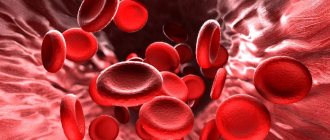Having heard the phrase “golden blood”, anyone will think that this is the name of another remedy that “saves from all diseases.” But in fact, golden blood is called the rarest blood type with a zero Rh factor, writes Big Think.
This blood type is so rare that it has only been found in 43 people worldwide. Until 1961, when this blood type was first discovered in an Aboriginal woman, doctors assumed that all embryos with Rh-null blood died in the womb.
Why are those with “golden blood” at greater risk than people with typical blood types? To answer this question, you must first determine by what principle scientists classify blood groups.
Minus or plus?
Tell me, how common are people with a negative Rh factor and what does this mean?
Valentin, Podolsk
– The Rh factor is a special type of protein that is found on the surface of red blood cells (erythrocytes). 80% of the planet's inhabitants have this protein. Such people are called Rh positive. If there is no protein on the membrane of red blood cells, they are Rh negative. These are respectively 20%.
At the same time, the presence of “negative” blood does not cause any particular inconvenience to its owner. This is not a disease or pathology, but just one of the options for genetic inheritance.
Total information
Many people wonder: what is blood type zero? The first one, actually. It is designated in the system as follows: “AB 0:0”. Although this option is more common - 0(I).
Scientific research confirms that this blood group is the most common in the world. For a long time there were no other options on the planet. This group is the simplest in structure, which is confirmed by its chemical analysis.
A child with 0(I) can be born to parents, each of whom has 0(I). Or if at least one of them has the first group, and the second has the third or second.
Double risk
A year ago I had an abortion; then I couldn’t afford to have a child. Now the situation has changed, and I dream of a baby. But I have a negative Rh factor. Tell me, can that abortion affect pregnancy?
Olga, Mozhaisk
- Unfortunately yes. During the abortion process, fetal blood may enter the mother's bloodstream. Antibodies produced in response to this during subsequent pregnancy are able to penetrate the placental barrier into the bloodstream of the unborn child, destroying his red blood cells, threatening his life. Particularly dangerous in this regard is the termination of the first pregnancy, which can lead to infertility.
Recently, to prevent Rh conflict, women are given anti-Rhesus immunoglobulin after childbirth or abortion. If you have not received such prophylaxis, this drug should be administered immediately after the onset of pregnancy following an abortion. And regularly throughout pregnancy you need to take a blood test for the presence of anti-Rhesus antibodies.
Problem filter
I heard that the problem of Rh sensitization can be solved with the help of plasmapheresis. But can pregnant women do this?
Margarita, Yaroslavl
– Not only is it possible, but it is also necessary! By removing antibodies that are harmful to the fetus from the bloodstream or reducing their concentration, plasmapheresis (blood purification method) is a very effective prevention of Rh conflict. True, if a woman has so-called complete antibodies in her blood, which are slowly synthesized and more difficult to pass the placental barrier. It is much more difficult to “pull out” a pregnancy with incomplete antibodies: they are synthesized in 10–14 hours, and it is impossible to “cleanse the blood” every day. Minimum – in 1–1.5 days. In order to maintain a normal antibody titer, some women have to undergo this procedure throughout their pregnancy.
Plasmapheresis has become a real lifesaver in the treatment of toxicosis in the first and second half of pregnancy, as well as in placental insufficiency, which is the main cause of intrauterine hypoxia (oxygen starvation) and fetal growth retardation.
Analyze it!
In what situations is it necessary to determine the Rh factor of blood? And in case of emergency, do you need to carry with you a reminder about what kind of blood you have?
Evgeniya, Voronezh region.
– Such an analysis must be done before planned surgery, blood transfusion and during pregnancy planning.
But it makes no sense to constantly carry with you a reminder about what kind of blood you have. According to the order of the Ministry of Health and Social Development, which is valid in all medical institutions in our country, before each blood transfusion, each person entering the hospital must have their blood type and Rh factor rechecked, since there is no guarantee that they were determined correctly.
Signs of people with negative Rh factor
Scientists even today do not know the secret of the origin of life on the planet, but the features of the “resusniks” are known thoroughly:
- analytical ability;
- eyes of any shade except gray and black;
- reddish curls;
- hypothermia or low body temperature – cold blood;
- hence the love for the Sun, warmth;
- hypotension (low blood pressure);
- they are more often than others “kidnapped” by aliens to take biosamples;
- may have “extra” ribs or vertebrae;
- have superpowers, can heal on an energetic level (often they themselves are not aware of this);
- cannot be cloned;
- have brilliant intuition.
Czech scientists believe that “negative” men are more likely to suffer from mental disorders.
Will there be no conflict?
I have negative Rh blood, and my husband has positive Rh. I recently found out that I am pregnant. They say that with such a combination big problems await me. This is true?
Ekaterina, Kaliningrad
– During the first pregnancy, special problems for Rh-negative women (even if she is expecting the birth of a Rh-positive child), as a rule, do not arise, since the mother’s immune system first encounters red blood cells that are foreign to her and, therefore, harmful to the fetus There are still few antibodies produced in her blood.
Everything is much more serious when such a woman becomes pregnant for the second time. After all, her blood now contains protective antibodies (“memory cells”) left over from her previous pregnancy. Therefore, the likelihood of Rh conflict (a kind of allergic reaction when the mother’s body begins to perceive the fetus as a foreign element) increases. Such a development of events is fraught with very serious consequences, including intrauterine fetal death.
Fortunately, modern medical technologies can solve this problem. It can be prevented by the introduction of a special vaccine - anti-Rhesus immunoglobulin, which suppresses the development and synthesis of anti-Rhesus antibodies and helps a woman endure pregnancy and give birth to a healthy baby.
A brief history of blood testing.
For a long time, our ancestors knew practically nothing about blood. Even the most basic knowledge about it, such as that bleeding means that a person is injured or sick, did not reach people's consciousness for a very long time.
Due to the lack of scientific facts about the nature and character of such a substance as blood, people invented different theories to explain it, which varied depending on the people and the historical period of human development. For example, Hippocrates connected medicine and people's temperaments by which fluid predominated in the body: blood, mucus, bile or black bile.
It was believed that the more blood people had, the more passionate, charismatic and impulsive they would be. It was believed that teenagers had a natural abundance of blood, and men had more blood than women.
This interpretation of blood led to the invention of ineffective methods in medicine. The famous physician Galen from Pergamon used it as a basis for prescribing bloodletting to patients. Supporting the idea that “when in doubt, you need to delete”
, Galen believed that bloodletting allowed patients to recover and put their bodies in order. Bloodletting was also believed to lower body temperature.
Although bloodletting was used by doctors until the 19th century, William Harvey's discovery of the circulation in 1628 marked the beginning of the medical path to modern hematology.
Shortly after Harvey's discovery, the first attempts at blood transfusion were made, but it was not until 1665 that the British physician Richard Lower successfully performed the first blood transfusion. Lower's operation was performed on dogs, and his success prompted doctors such as Jean-Baptiste Denis to try to transfuse animal blood into humans, which was later called xenotransfusion. The deaths of human patients who received animal blood transfusions eventually led to the practice being outlawed.
It is unknown when the first successful person-to-person transfusion would have occurred if British obstetrician James Blundell had not treated a patient for postpartum hemorrhage in 1818. However, even with the use of a proven blood transfusion technique, patients died for many years after the procedure for reasons unknown to doctors.
The secret of blood was revealed by the Austrian doctor Karl Landsteiner. In 1901 he began work on the classification of blood groups. Exploring the work of Leonard Landois, a physiologist who showed that when red blood cells from one animal are introduced into the body of another animal, they stick together.
Landsteiner thought that a similar reaction could occur when blood is transfused from one person to another, which determines the success or failure of the procedure. In 1909, he classified blood into groups 1, 2, 3 and 4, and for his work received the 1930 Nobel Prize in Physiology or Medicine.
Incredible? Obvious!
My child has negative Rh blood factor, while my husband and I have positive blood. My husband still teases me about this: they say, from whom did she cheat? I know that nothing happened. But the question haunts me: how could this happen? After all, a child will definitely inherit the blood of his parents. Is not it?
Olga, Kostroma
- No not like this. There is nothing supernatural in your situation. It is explained by the fact that a person with a positive Rh factor may be a carrier of a negative Rh gene, which is suppressed by a stronger positive gene.
But when this negative gene is present in the blood of both parents, then, doubling its strength, it can be passed on to the child and form a Rhesus with a minus sign. According to statistics, for Rh-positive parents this situation is possible in 25% of cases.
Difference from Rh positive
Basically, negative Rh is no different from positive. In addition, Rh(–) does not show external signs. That is, this feature is not a pathology or deviation of the body.
Want to know more about Rh positive?? Then follow the following link.
There are only a number of situations where Rh(–) plays a role:
- Preoperative period - during surgery, doctors are required to find out the patient’s Rh factor in order to prepare blood for transfusion in case of blood loss.
- Planning pregnancy - in women with Rh(–), there is a possibility of developing RK, when the child inherits the Rh-positive father. Then problems may arise both with conception and with the subsequent bearing of a healthy child.
- Abortion - if a woman with Rh(–) had an abortion during her first pregnancy, then there is a high probability of future complications - infertility or miscarriage.
- It is not possible to clone people with Rh(–).
Don't need stock?
I will soon have major heart surgery. But I have Rh negative blood. They say that in such cases you need to go to a blood transfusion station and donate it “in reserve” - in case of bleeding. Is it worth doing?
Vsevolod, Moscow
Article on the topic
Where to donate blood faster and cheaper?
– Rh negative blood is always in short supply. But, if we are talking about a planned operation, like yours, the medical institution, as a rule, orders blood for it in advance. Especially if the risk of bleeding is expected.
A difficult situation with Rh-negative donor blood can arise in the event of an emergency operation, when a person is admitted to the hospital after a traffic accident or other accident. You can't think about it anymore. We need to act. How? Contact blood transfusion stations located in large (preferably federal) medical centers. Or look for the blood you need in the city’s medical network. If it was not possible to resolve this issue in this way, you need to call out friends and acquaintances or go to the nearest military or fire station and look for voluntary donors with the blood Rh blood you need.
By the way, when getting ready for surgery, remember if you have ever had a massive blood transfusion (blood transfusion). In this case, you need to select donor blood especially carefully. Otherwise, with your next blood transfusion, you may experience serious or even life-threatening problems, regardless of your Rh factor.











